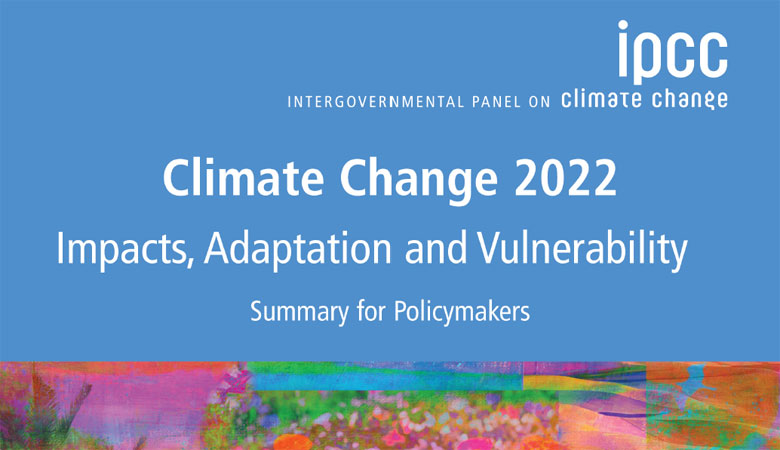Climate Action for Mitigation and Adaptation Must Contribute to the Eradication of Poverty

The Intergovernmental Panel on Climate Change (IPCC) has just published a new report, “Climate Change 2022: Impacts, Adaptation and Vulnerability”. This report states that climate change is a threat to the well-being of humanity and the health of the planet. This includes dangerous and widespread disruptions that affect the lives of billions of people around the world. The IPCC reiterates that the intensification of warming will further aggravate the situation. It confirms the concerns raised by ATD Fourth World since the signing of the Paris Agreement on climate change.
“Poverty – Livelihoods and Sustainable Development”
In chapter 8 entitled “Poverty, Livelihoods and Sustainable Development” the report’s scientists confirm that people in poverty are already the first affected by the impacts of climate change.
They indicate that:
- “Existing vulnerabilities and inequalities intensify with adverse impacts of climate change. These impacts disproportionately affect marginalised groups, amplifying inequalities and undermining sustainable development across all regions.
- “Observed average mortality from floods, drought and storms is 15 times higher for countries ranked as very high vulnerable.”
They go on to add that people in poverty will be even more affected in the future without strong measures:
- “If future climate change under high emissions scenarios continues and increases risks, without strong adaptation measures, losses and damages will likely be concentrated among the poorest vulnerable populations.”
- The authors continue: “In many cases, the poor and most vulnerable people/groups are most adversely affected by maladaptation” and “Climate justice and right based approaches are increasingly recognized as a key principle within mitigation and adaptation strategies and projects.”
These observations are not new for ATD Fourth World.
Ensuring just a transition
ATD Fourth World members participated in COP26 of November 2021 in Glasgow. At this time they reminded participants that the 2015 Paris Agreement provided for climate action that is part of a policy of poverty eradication and that there was a need for a concrete implementation of this approach.
Although the Glasgow Pact is generally disappointing, ATD Fourth World pointed to a major step forward in Article 52 that “Recognizes the need to ensure just transitions that promote sustainable development and eradication of poverty, and the creation of decent work and quality jobs…”.
ATD Fourth World also highlights that written in the Glasgow Pact’s introduction is “… climate change is a common concern of humankind, Parties should, when taking action to address climate change, respect, promote and consider their respective obligations on human rights, the right to health, the rights of indigenous peoples, local communities, migrants, children, persons with disabilities and people in vulnerable situations and the right to development, as well as gender equality, empowerment of women and intergenerational equity.”
“We will be even poorer”
Last November, Alain, a Swiss Fourth World activist, said:
- “The ecological question scares me a lot. I have the impression that we will be even poorer. The more we do about the climate, the more poverty we will create. We must give everyone the dignity of life. For me, the fight is to bring this vision of giving a planetary balance1.”
These words fully resonate with the fears raised in the new IPCC report.
Climate mitigation and adaptation action must contribute to the eradication of poverty
Faced with the threat of climate change and ill-thought-out mitigation and adaptation policies, which will worsen the lives of people in poverty, ATD Fourth World is once again asking states to put into their national laws the need for climate action that contributes to the eradication of poverty, and other stakeholders (local authorities, businesses, NGOs, etc.) to consider integrating poverty eradication into their actions.
ATD Fourth World reminds all stakeholders of the Paris Agreement and the Glasgow Pact of the need to:
- Place a special emphasis on the bottom 20% who live in extreme poverty to make sure no one is left behind
- Tackle climate change together with people in poverty, so that solutions are developed, implemented, and evaluated with them
- Ensure that funding for the fight against climate change targets the most vulnerable populations, in order to promote climate justice
- Establish social protection floors
- Guarantee that populations living in poverty can benefit from training and job creation in the transition to a green economy.
ATD Fourth World’s COP26 position paper
Other articles by ATD Fourth World on this subject:
COP26 Glasgow: Climate Action Must Include Eradicating Extreme Poverty
ATD Fourth World at COP26 in Glasgow: Standing up for Climate Justice
IPCC report:
Climate Change 2022: Impacts, Adaptation and Vulnerability
Technical Summary
Summary for Policymakers

